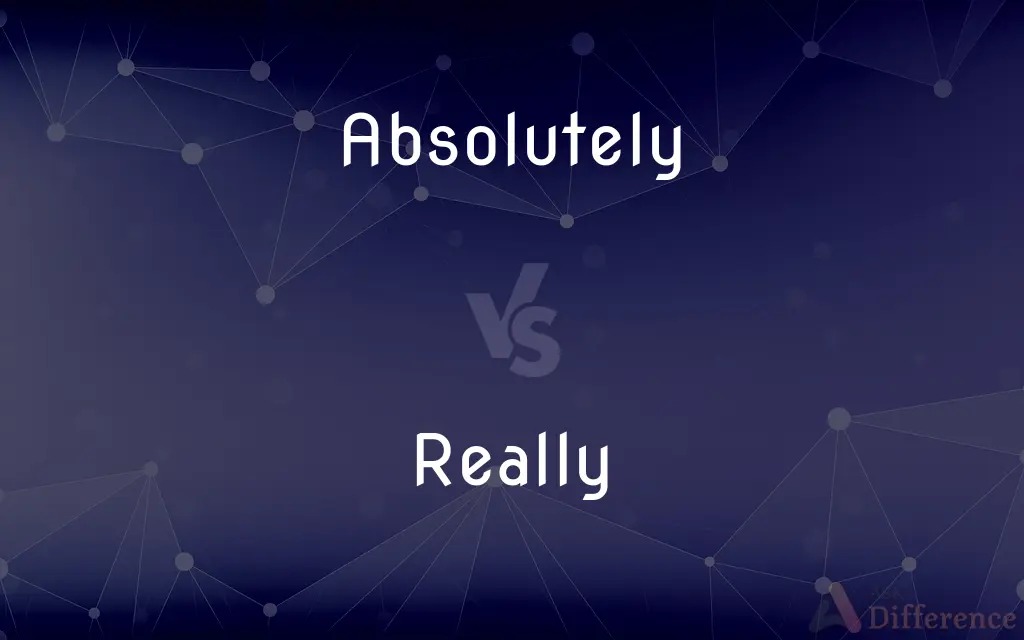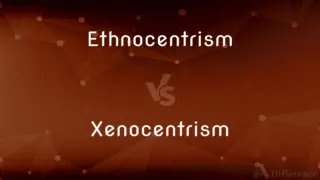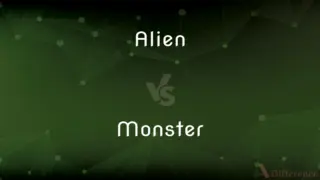Absolutely vs. Really — What's the Difference?
Edited by Tayyaba Rehman — By Fiza Rafique — Updated on March 14, 2024
Absolutely and really both intensify statements, but absolutely connotes total agreement or certainty, while really emphasizes authenticity or truth.

Difference Between Absolutely and Really
Table of Contents
ADVERTISEMENT
Key Differences
Absolutely is often used to express complete agreement or to emphasize the certainty of a statement. It leaves no room for doubt, suggesting that something is completely true or certain. Really, on the other hand, is used to express that something is true or to emphasize the authenticity of a statement. It can also be used to express surprise or skepticism, depending on the context.
While absolutely often serves as a strong confirmation or an emphatic way to express agreement, really can be used more flexibly to emphasize various aspects of a statement, including surprise, doubt, or confirmation. This versatility makes really suitable for a wider range of contexts compared to the more definitive and emphatic absolutely.
In certain contexts, absolutely and really can be used interchangeably, especially in casual speech. However, the choice between them can subtly change the nuance of a statement, with absolutely generally providing a stronger, more unambiguous emphasis compared to the more nuanced and versatile really.
Absolutely and really differ in their connotations and typical usage patterns. Absolutely implies complete agreement or certainty, making it a popular choice in formal contexts or when wanting to leave no room for doubt. Really, with its broader range of uses, is more common in everyday language and can convey a variety of nuances depending on the context.
Comparison Chart
Connotation
Total certainty or complete agreement
Authenticity, truth, or emphasis
ADVERTISEMENT
Common Usage
Formal agreement, strong affirmation
Emphasizing truth, expressing surprise
Flexibility
Less flexible, more definitive
More flexible, various uses
Intensity
Stronger, leaves no room for doubt
Can be strong, but often less definitive
Contextual Suitability
Formal settings, definitive statements
Everyday language, varied contexts
Compare with Definitions
Absolutely
Completely and without qualification; used for emphasis.
She is absolutely brilliant at her job.
Really
In actual fact, as opposed to what is said or imagined to be true.
Is he really going to quit?
Absolutely
Used to express total agreement.
Are you sure about this? Absolutely.
Really
Very; used to emphasize the degree of something.
The test was really difficult.
Absolutely
In an absolute manner; entirely.
The situation has changed absolutely.
Really
Used to convey that something is genuine.
The fear in her voice was really apparent.
Absolutely
Without any doubt.
The evidence was absolutely clear.
Really
Used to emphasize the sincerity of a statement.
I really appreciate your help.
Absolutely
Used to emphasize something positive.
The performance was absolutely wonderful.
Really
Expressing surprise, interest, or doubt.
Really? When did this happen?
Absolutely
Without qualification or restriction; completely
The substance was absolutely pure.
Really
In actual truth or fact
There isn't really a lake there.
It's just a mirage.
Absolutely
Used as an intensive
I absolutely love that restaurant. That's absolutely ridiculous.
Really
To a great degree; very much
I would really like to meet your sister.
Absolutely
As you say. Used to indicate agreement.
Really
Very; utterly
That was a really enjoyable evening.
Absolutely
In a manner that does not take an object.
Really
Without a doubt; indeed
Really, I don't want more dessert.
Absolutely
In an absolute relationship.
Really
Used to express surprise, skepticism, displeasure, or interest
"I've been reading her diary." "Really?".
Absolutely
In an absolute or unconditional manner; utterly, positively, wholly.
Really
(literal) In a way or manner that is real, not unreal.
Absolutely
Independently; viewed without relation to other things or factors.
Really
(modal) Actually; in fact; in reality.
"He really is a true friend." / "Really? What makes you so sure?"
Absolutely
(grammar) In a manner that does not take an object.
Really
Very (modifying an adjective); very much (modifying a verb).
But ma, I really, really want to go to the show!
Absolutely
Yes; certainly; expression indicating strong agreement.
Really
Indicating surprise at, or requesting confirmation of, some new information; to express skepticism.
A: He won the Nobel Prize yesterday.
B: Really?
Absolutely
In an absolute, independent, or unconditional manner; wholly; positively.
Really
Indicating that what was just said was obvious and unnecessary; contrived incredulity
A: I've just been reading Shakespeare - he's one of the best authors like, ever!
B: Really.
Absolutely
Completely and without qualification; used informally as intensifiers;
An absolutely magnificent painting
A perfectly idiotic idea
You're perfectly right
Utterly miserable
You can be dead sure of my innocence
Was dead tired
Dead right
Really
Indicating affirmation, agreement.
A: That girl talks about herself way too much.
B: Really. She's a nightmare.
Absolutely
Totally and definitely; without question;
We are absolutely opposed to the idea
He forced himself to lie absolutely still
Iron is absolutely necessary
Really
Indicating displeasure at another person's behaviour or statement.
Well, really! How rude.
Really
Royally.
Really
In a real manner; with or in reality; actually; in truth.
Whose anger is really but a short fit of madness.
Why, really, sixty-five is somewhat old.
Really
In accordance with truth or fact or reality;
She was now truly American
A genuinely open society
They don't really listen to us
Really
In actual fact;
To be nominally but not actually independent
No one actually saw the shark
Large meteorites actually come from the asteroid belt
Really
In fact (used as intensifiers or sentence modifiers);
In truth, moral decay hastened the decline of the Roman Empire
Really, you shouldn't have done it
A truly awful book
Really
Used as intensifiers; `real' is sometimes used informally for `really'; `rattling' is informal;
She was very gifted
He played very well
A really enjoyable evening
I'm real sorry about it
A rattling good yarn
Common Curiosities
Is "absolutely" more formal than "really"?
Generally, yes, "absolutely" is often used in more formal contexts.
Is "absolutely" stronger than "really"?
Often, yes, as "absolutely" implies complete agreement or certainty.
Can "really" express doubt?
Yes, depending on the context, it can be used to express doubt or surprise.
Can "absolutely" and "really" be used interchangeably?
In some contexts, yes, but they can convey different degrees of emphasis or certainty.
Can "really" be used to enhance positive statements?
Yes, "really" can enhance positive statements by emphasizing sincerity or intensity, e.g., "I really love this song."
How does tone affect the meaning of "really"?
The tone can significantly alter its meaning, from expressing genuine curiosity to skepticism or surprise.
How does the context change the use of "absolutely" and "really"?
The context, such as formal vs. casual or statement vs. question, can dictate which word is more appropriate based on the desired emphasis or tone.
Can "really" be used to express degrees of intensity?
Yes, "really" can indicate varying degrees of intensity, often through tone or additional context.
What are some common situations where "absolutely" is preferred over "really"?
"Absolutely" is preferred when making formal affirmations or when a strong sense of agreement is needed.
How does "really" add emphasis to a statement?
By intensifying the authenticity or truth of the statement.
Can "absolutely" imply a sense of finality in a decision or opinion?
Yes, "absolutely" often conveys a sense of finality or irrevocability in decisions or opinions.
How do non-native speakers perceive the difference between "absolutely" and "really"?
Non-native speakers might find the nuances subtle, but with practice, they can learn to use each word in its appropriate context to convey the right degree of emphasis or certainty.
Is it appropriate to use "absolutely" in casual conversations?
Yes, it can be used in casual conversations, especially to express strong agreement or certainty.
Do "absolutely" and "really" have synonyms that can be used interchangeably?
Yes, synonyms like "definitely" for "absolutely" and "truly" for "really" can sometimes be used interchangeably, depending on the context.
Is "really" commonly used in questions?
Yes, it's often used in questions to express surprise or seek confirmation, e.g., "Did he really say that?"
Share Your Discovery

Previous Comparison
Ethnocentrism vs. Xenocentrism
Next Comparison
Alien vs. MonsterAuthor Spotlight
Written by
Fiza RafiqueFiza Rafique is a skilled content writer at AskDifference.com, where she meticulously refines and enhances written pieces. Drawing from her vast editorial expertise, Fiza ensures clarity, accuracy, and precision in every article. Passionate about language, she continually seeks to elevate the quality of content for readers worldwide.
Edited by
Tayyaba RehmanTayyaba Rehman is a distinguished writer, currently serving as a primary contributor to askdifference.com. As a researcher in semantics and etymology, Tayyaba's passion for the complexity of languages and their distinctions has found a perfect home on the platform. Tayyaba delves into the intricacies of language, distinguishing between commonly confused words and phrases, thereby providing clarity for readers worldwide.
















































